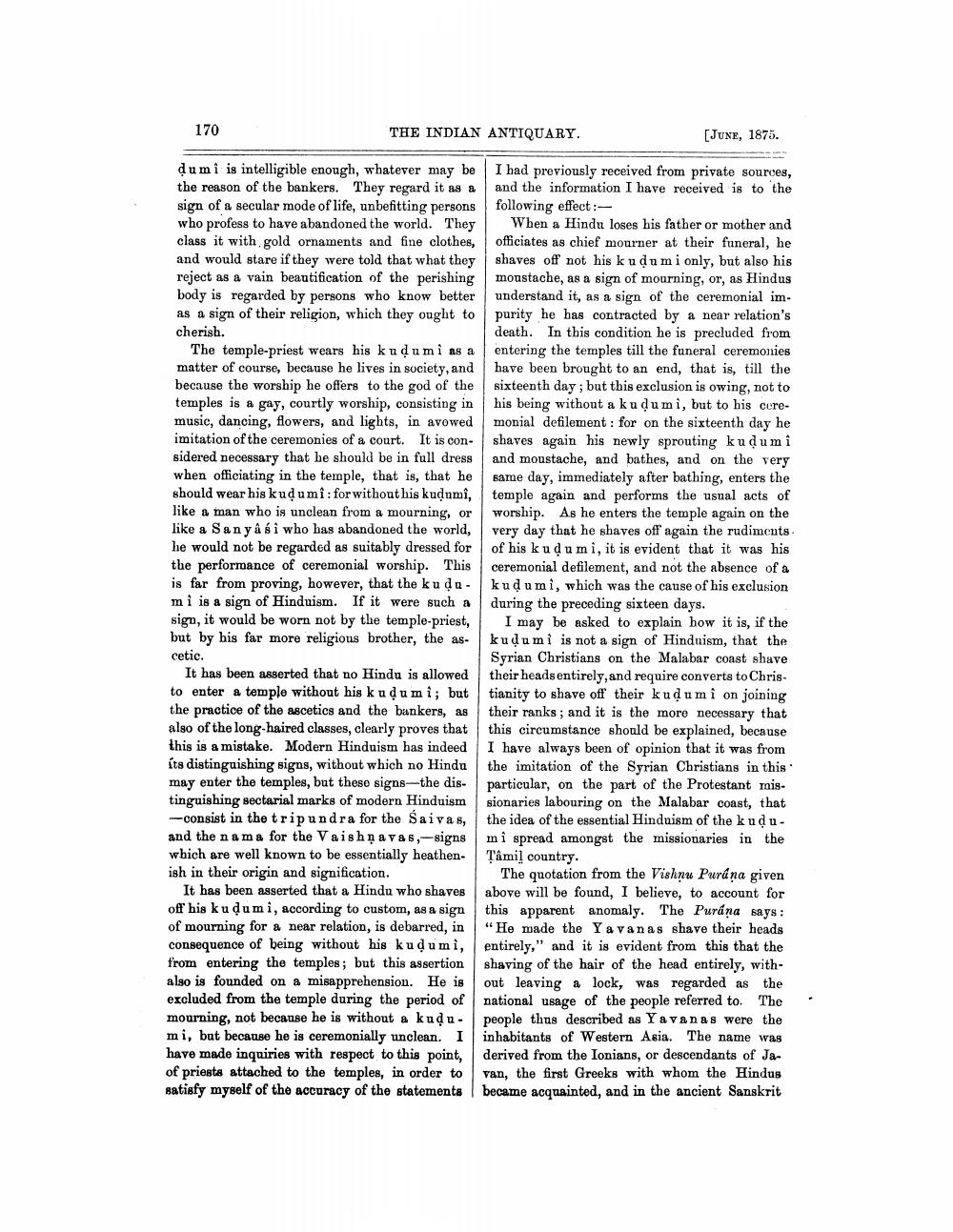________________
170
THE INDIAN ANTIQUARY.
dumi is intelligible enough, whatever may be the reason of the bankers. They regard it as a sign of a secular mode of life, unbefitting persons who profess to have abandoned the world. They class it with gold ornaments and fine clothes, and would stare if they were told that what they reject as a vain beautification of the perishing body is regarded by persons who know better as a sign of their religion, which they ought to cherish.
The temple-priest wears his kudumi as a matter of course, because he lives in society, and because the worship he offers to the god of the temples is a gay, courtly worship, consisting in music, dancing, flowers, and lights, in avowed imitation of the ceremonies of a court. It is considered necessary that he should be in full dress when officiating in the temple, that is, that he should wear his kuḍumi: for without his kudumi, like a man who is unclean from a mourning, or like a Sanyasi who has abandoned the world, he would not be regarded as suitably dressed for the performance of ceremonial worship. This is far from proving, however, that the kudu mi is a sign of Hinduism. If it were such a sign, it would be worn not by the temple-priest, but by his far more religious brother, the as
cetic.
It has been asserted that no Hindu is allowed to enter a temple without his k u dumi; but the practice of the ascetics and the bankers, as also of the long-haired classes, clearly proves that this is a mistake. Modern Hinduism has indeed íts distinguishing signs, without which no Hindu may enter the temples, but these signs-the distinguishing sectarial marks of modern Hinduism -consist in the tripundra for the Saivas, and the n a ma for the Vaishnavas,-signs which are well known to be essentially heathenish in their origin and signification.
It has been asserted that a Hindu who shaves off his kudumi, according to custom, as a sign of mourning for a near relation, is debarred, in consequence of being without his kuḍumi, from entering the temples; but this assertion also is founded on a misapprehension. He is excluded from the temple during the period of mourning, not because he is without a kuḍumi, but because he is ceremonially unclean. I have made inquiries with respect to this point, of priests attached to the temples, in order to satisfy myself of the accuracy of the statements
[JUNE, 1875.
I had previously received from private sources, and the information I have received is to the following effect:
When a Hindu loses his father or mother and officiates as chief mourner at their funeral, he shaves off not his kuḍumi only, but also his moustache, as a sign of mourning, or, as Hindus understand it, as a sign of the ceremonial impurity he has contracted by a near relation's death. In this condition he is precluded from entering the temples till the funeral ceremonies have been brought to an end, that is, till the sixteenth day; but this exclusion is owing, not to his being without a kudumi, but to his ceremonial defilement: for on the sixteenth day he shaves again his newly sprouting kudumi and moustache, and bathes, and on the very same day, immediately after bathing, enters the temple again and performs the usual acts of worship. As he enters the temple again on the very day that he shaves off again the rudiments of his ku du mi, it is evident that it was his ceremonial defilement, and not the absence of a kudumi, which was the cause of his exclusion during the preceding sixteen days.
I may be asked to explain how it is, if the kudu mi is not a sign of Hinduism, that the Syrian Christians on the Malabar coast shave their heads entirely, and require converts to Christianity to shave off their kudumi on joining their ranks; and it is the more necessary that this circumstance should be explained, because I have always been of opinion that it was from the imitation of the Syrian Christians in this particular, on the part of the Protestant missionaries labouring on the Malabar coast, that the idea of the essential Hinduism of the kudumi spread amongst the missionaries in the Tâmil country.
The quotation from the Vishnu Purana given above will be found, I believe, to account for this apparent anomaly. The Purána says: "He made the Yavanas shave their heads entirely," and it is evident from this that the shaving of the hair of the head entirely, without leaving a lock, was regarded as the national usage of the people referred to. The people thus described as Yavanas were the inhabitants of Western Asia. The name was derived from the Ionians, or descendants of Javan, the first Greeks with whom the Hindus became acquainted, and in the ancient Sanskrit




